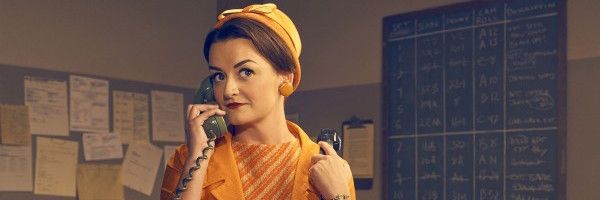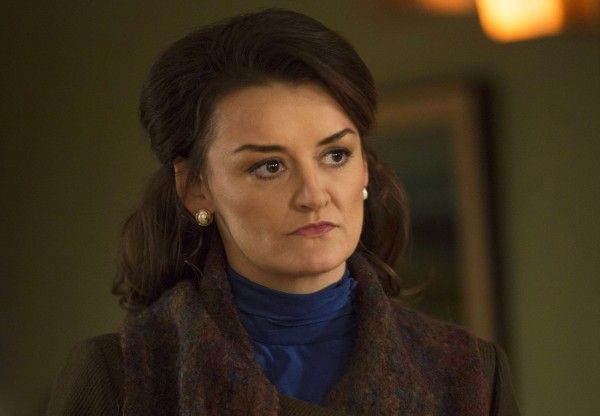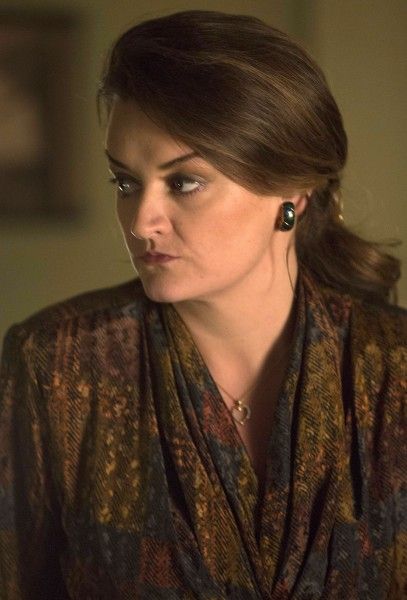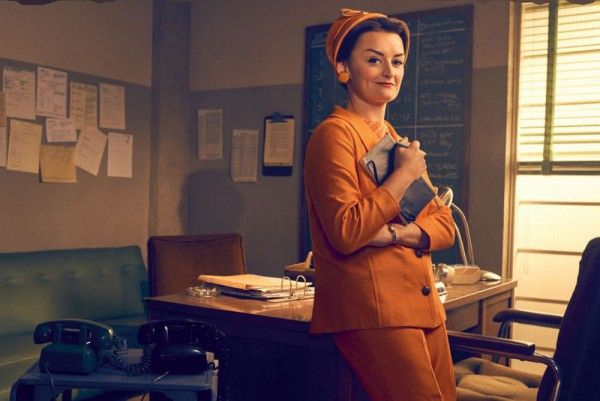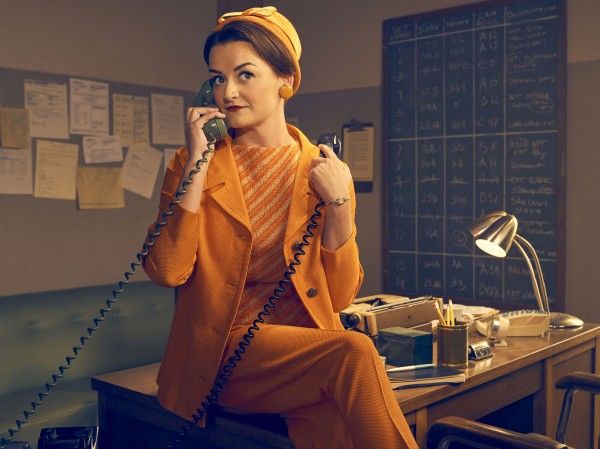The first installment of the new FX anthology series from Ryan Murphy, Feud: Bette and Joan tells the story of the legendary rivalry between actresses Joan Crawford (Jessica Lange) and Bette Davis (Susan Sarandon) during their collaboration on What Ever Happened to Baby Jane? Through the lens of ageism, sexism and misogyny, the two women tried to hang on to success and fame in their careers, as long as they possibly could, even if it mean directly attacking or sabotaging each other. The series also stars Alfred Molina, Stanley Tucci, Judy Davis, Jackie Hoffman and Alison Wright, with appearances by Catherine Zeta-Jones, Sarah Paulson, Kathy Bates and Kiernan Shipka.
During this 1-on-1 interview with Collider, actress Alison Wright (who plays Baby Jane director Robert Aldrich’s assistant, Pauline) talked about how proud she is to be a part of the FX family, how she feels about the way things wrapped up with her character on The Americans, the differences in working on the two TV series, why she jumped at the chance to be a part of a Ryan Murphy project, what she enjoys most about Pauline, playing a woman ahead of her time, and what she thinks of both Bette Davis and Joan Crawford.
Collider: The Americans and your terrific performance on that show is the first time that many people became aware of you and your work. And now, here you are again, on another FX show, with Feud: Bette and Joan. What has it meant to you to be a part of the FX family and work in such a creatively exciting environment?
ALISON WRIGHT: I know. I feel like it’s just luck that the next show that I got happened to be on FX. I’d like to think that they wanted to adopt me, but I don’t think that’s what it is. It just happened to be that this is the next gig that I got. That being said, this is probably the best time for anybody to jump on board with FX because they have been soaring, the past couple of years. They’re one of the most important outlets on television, these days. FX is knocking it out of the park. I’m very proud and willing to be a part of that, for sure.
After having such a great arc on The Americans, and so many incredible twists and turns to your story there, was it bittersweet to have that character depart, in the way that she did, or are you happy that she’s still alive and out there and could return, at some point?
WRIGHT: I don’t think of it as bittersweet, at all, or in any way negative, whatsoever. I think I got the best possible send off, that any actor could ask for in a job. The last season – Season 4 – was the culmination of Martha’s story, and I don’t think an actor could ask for more. I am jumping for joy, the way it worked out. You have to serve the story. I couldn’t have asked for more. It was excellent. It was perfect. It doesn’t matter what happens, from here on out. The journey for her was excellent, and that’s echoed by the public, on a daily basis, as far as how much they care for her, still think about her, and have hopes and dreams for her. They’ve really managed to invest in this character that initially a lot of people poo-pooed, to some extent, criticized, judged and thought, “Oh, she’s so stupid that she doesn’t know this. How naive is she that she’s not understanding this?” And then, all of those people ate all of their hats when the tables turned, and everybody embraced her. I couldn’t possibly ask for more. It was perfect.
How does being a part of Feud and that incredibly talented ensemble of actors, under the guidance of Ryan Murphy, compare to your experience on The Americans, with that incredibly talented ensemble of actors, under the guidance of Joe Weisberg and Joel Fields?
WRIGHT: The Americans and Feud could not have been more different. They’re in different universes to each other, and the experiences couldn’t have been more opposite. It was perfect to work on this story of Ryan Murphy’s, in this world and with these titans with all their smoke and mirrors and illusions. To be living in L.A. for the first time, for a serious chunk of time, and working with those actresses, not to mention the actresses that they’re playing, couldn’t be further removed from the stinky Gowanus Canal in Brooklyn. The Americans was always under the radar. Maybe we were always the cool kids, but we were never the popular kids. We just got on with it and did the work. Whereas working on a Ryan Murphy show is a gigantic machine, where you’re on the Fox lot in L.A. It couldn’t be more foreign.
How did you come to Feud?
WRIGHT: I’m very proud to say that this was just a straight offer. It was not my first straight offer, but coming from Ryan Murphy, my agents and my manager called me about it to let me know. They were about to break it down for me, and I was like, “No, no, no, no, I know all about this. I know all about the project and who’s doing it.” I’m very interested in Ryan Murphy and his subject matter, and the aesthetic of the world that he creates. Also, because of the actresses that were in it, I knew all about it. So, I lost my shit when they called and informed me that Ryan Murphy felt that he wanted me in one of his shows. That was one of those tremendous moments that, as an actor, you can only pray might happen to you, now and then. I was tremendously grateful, and still am. Any actor’s life can change, in any phone call on any given day, and that was definitely one of those days.
It sounds like you might have signed on to play any character that Ryan Murphy offered you.
WRIGHT: Don’t tell him that!
Once you had signed on to play Pauline, what was it about her that you most enjoyed?
WRIGHT: Well, I had the luxury of Pauline being a composite character. She’s definitely the only regular character, and perhaps the only character in the mini-series, that is not a specific real person. She’s built of all the women that were in the studio system, who had career ambitions and an endgame that wasn’t just children and marriage. She wants to be a director. She wants to work in Hollywood. She’s very capable and able, but she’s a woman in 1962. That’s a very valid story to tell, especially in this moment. We shot quite a few of the episodes before the election happened, and there was a certain color to the scenes that we were doing. There was a certain way that I felt when I said lines like, “Men might not want to have a woman in charge.” There was a certain way that I felt saying that, feeling pretty confident that Hillary Clinton was going to become the next President. And then, we had the election the next day, and we went in and were shooting the same thing, and it was a very different feeling. It was very grounding to go, “Hang on, how much have we moved on in 60 years? Oh, shit, none at all?!” It was a real privilege to represent the voice of all of these women. Pauline, and the women that she represented within this world, is the voice of all of us, and still today, obviously. It really was important.
How would you describe the relationship between Pauline and Robert Aldrich?
WRIGHT: I think what Pauline thinks it is and what Bob thinks it is are different things, and that comes to a head in Episode 4 when she gives him her script. What she thinks the relationship is, is not what he thinks the relationship is. That’s not the first time that’s happened between a man and a woman. I think she assumes that she was being treated as an equal. I’m not sure where it came from, at that time, but Pauline has a lot of confidence in her ability and in her future plans, and they are squashed. She’s quite shocked by that. I think she expected more. She expected fair treatment, and maybe even equal treatment, to a certain extent. She was, perhaps, ahead of her time. She’s kind of the voice of reason. She’s quite sensible and able to hold her own against Joan Crawford and Bette Davis. For that time, that was a different kind of idea. Women were very controlled by men then, and by the position of what they were expected to be in society and within the home. Pauline wasn’t looking for any of that. She wanted more. She dreamed big. Maybe she dreamed like a man, but she dreamed bigger than the women of her time, for sure.
What’s it been like to work with Alfred Molina and explore that dynamic with an actor like him?
WRIGHT: It’s ridiculous! I’ve been a fan of Fred’s for ages. In his film, An Education, that he did not too long ago, he was basically playing my father. Ryan works with very high caliber people, across the board, in front of the camera and especially behind. His hair and make-up, costume people and production designers are off the hook. It’s a very high standard and everybody really wants to be there. Everyone is so grateful to be there, and they’re aware of what a tremendous movement they’re a part of, being with him. He really is something else.
This wardrobe, the sets and the production design are pretty spectacular. How much does being on these sets, surrounded by all of the detail in the wardrobe, really help you, in portraying this character in this time period?
WRIGHT: So much, and on multiple levels, too. Who doesn’t want to live in old world Hollywood glamour. It’s such a sumptuous time. It’s decadent and gorgeous, and we all wish we were still like that. There’s a certain attraction to the purity of that time. So, to be able to walk around in that world and in those costumes is glorious and amazing. It’s double-pronged, of course, because it’s what the character would have felt and it’s what I actually feel. You can just smush those two things together and they work as one. It was amazing! I was so floored by the level of the production design.
When it comes to Bette Davis and Joan Crawford, what were your feelings about them, as actresses? Do you have favorite films of theirs?
WRIGHT: If one was pitted against the other, I knew which side I was on. Before I started this, it was absolutely, 100%, Bette Davis. She was the actress. Joan was a creation, unto herself. She was always Joan Crawford. God knows where Lucille LeSueur went. She was so dedicated, in a different way than Bette. But after working with Bette, I honestly think Joan became a better actress. If you look at her work after What Ever Happened to Baby Jane?, I think Straight-Jacket is some of Joan Crawford’s best acting work, ever. It was considered a hack horror film, but I think she really stepped up her game, after Bette Davis showed her what she was made of in Baby Jane. They were so fascinating. They had very different things to offer, and they were massively successful women who did it on their own. I have tremendous respect for both of them, but I have a lot more empathy now for Joan Crawford. It’s impossible to watch Jessica Lange and not have empathy for her performance. She has definitely colored the way that I feel about Joan Crawford.
Feud: Bette and Joan airs on Sunday nights on FX.

